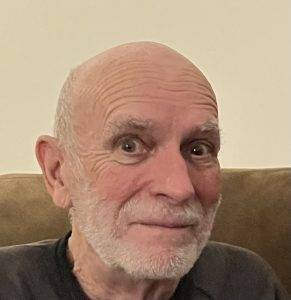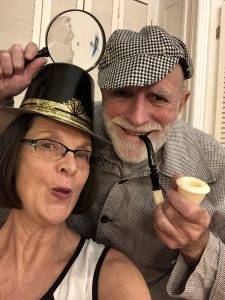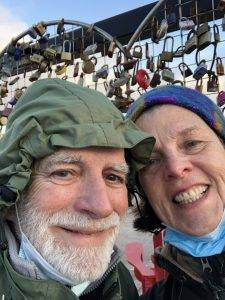
Frank Driscoll was no stranger to his own mortality. A shooting accident when he was twelve left him with one leg considerably shorter than the other after a long hospital stay and considerable medical interventions. It was no surprise then that he hoped for a “good death” while asleep at home. Unfortunately, pulmonary fibrosis had other plans for him. In 2016, he was diagnosed with “stable” idiopathic pulmonary fibrosis (IPF), first by a doctor in Costa Rica, where he and his wife Jude wintered for many years, and then confirmed by doctors at home in Charlottetown, PEI.
For five years his life continued largely unchanged, with minimal symptoms, but in the spring of 2021 he experienced an acute exacerbation, while in Costa Rica. Frank had heart palpitations and profuse sweating, says his wife Jude. They went to the hospital in Costa Rica where he had extensive testing and was seen by the same respirologist who diagnosed him in 2016.
This time, during his six-minute walking test, his oxygen level went down to 81 per cent. The respirologist recommended that Frank fly home with oxygen and have a CT scan done as soon as possible. A CAT scan was already booked for their return. Along with his IPF, Frank also had GERD (gastroesophageal reflux disease) and nasal drip, which can both contribute to possible lung infection and complications.
In May, Frank began taking anti-fibrotic medication, which he tolerated well. In terms of oxygen, he had stationary and portable tanks, as well as back up for the power outages. But, his decline continued. Their daughter, who has a rare genetic condition, and lives near them in PEI, could also see that her father was losing weight and getting weaker.

costume party in happier times.
“He said that he was fading away,” says Jude, “because he could no longer haul wood or dig in the garden.” Fortunately, he loved to read the paper, talk with his buddies and worked on a memoir. He had plenty to remember. When he retired, he was the Chief Sherriff of PEI. And in his 20s, he travelled around the world and he and his wife travelled extensively in Central America. He loved adventure and meeting the local people. “I think his ability to explore made the end of his life a kind of adventure for him that he explored with both mind and heart,” says Jude.
He had plenty to remember. When he retired, he was the Chief Sherriff of PEI. And in his 20s, he travelled around the world and he and his wife travelled extensively in Central America. He loved adventure and meeting the local people. “I think his ability to explore made the end of his life a kind of adventure for him that he explored with both mind and heart,” says Jude.
In August 2021, the respirologist offered them referrals for home care and MAiD (Medical assistance in dying). Frank asked for both. Home care began with biweekly nursing monitoring.
In October, Frank and Jude travelled to the Yukon to visit their two sons and meet their first grandchild. “We spoke with them about MAiD and dying with dignity. Our youngest son remembers Frank saying he appreciated having the option, given the terminal nature of his condition,” says Jude. “He also remembers that Frank was frank and reasonable about death and wanted a good death with family near.
By this time, Frank who was mentally sharp until the end, had all of his affairs in order. Estate planning was done and he had his Advanced Care Directive done, indicating comfort measures only. “Frank was all about quality of life and taking care of business,” adds Jude.
Frank considered a transplant, but decided it was not for him and his family. Going through the health directives process had the couple think seriously about various options. In addition, a book club meeting that discussed the book Curtains by Tom Jokinen, had them thinking about how various cultures approach death and grieving.

By Christmas 2021, Frank was using oxygen 24/7, but could still walk six minutes down to the parking area, says Jude. But, by Easter this year, he was in a wheelchair as he could only walk 20 steps.
Integrative palliative care began when he had trouble with mobility and he needed a hospital bed for comfort. “He called it his Command Central,” says Jude. It had a bedside table, where he could work on his memoir or eat a meal if he was too tired to walk to the table.
The Driscolls’ lives slowed down drastically.
“Frank needed to rest after getting up from his bed,” says Jude. “Actually after almost any movement, he needed to rest for five to 15 minutes. I ended up being the cook, which he had always done. And I assisted with all his care: medications, urinal, warm rice bag for nausea and purchasing cannabis gummy bears for his nausea. Talking on the phone, Frank would speak the most important things and then I would tell them where we were at. We slept together every night and the coughing was managed by the pain meds and the CPAP machine, including with oxygen, the last six months. It was an exhausting time for me as a caregiver and we were unaware that we could hire private help.”
And the pandemic created challenges getting medical care. “We didn’t think that we would be able to get help during this time because of the shortage of health care staff,” says Jude.
The Home Care Nurse Manager was the primary contact with Frank’s medical doctor. There was no respite care available and there was no hospital bed available for a medication adjustment phase as recommended by Frank’s family doctor, due to COVID. The Palliative Care Center was full with a waiting list for a month or more.
Twice Jude and Frank went to emergency as recommended by a nurse and a doctor, but both times they were sent back home. And two months before Frank died, it took home care three weeks to provide once weekly bathing assistance and two hours of respite for Jude. “Not enough in my opinion,” says Jude.
Another huge gap in care was that they did not know until weeks before Frank’s death that there was a list of nursing staff available for hire. Eventually they got a list of licensed practical nurses (LPNs) available to help care for Frank. One consistent LPN for two hours a day made a huge difference.
Socially too, the couple were limited to meeting with one other couple “in their bubble” during the pandemic.
By Easter, Frank and Jude had talked to MAiD staff about making arrangements for Frank to die at home. A date and time need to be coordinated with the attending medical staff. The Home Care Nurse Manager helped to secure the necessary signature on a Notice of Expected Death at Home form, which meant the police would not be called and no autopsy would be performed following his medically expected death.
Frank’s sons and three sisters, as well as 95-year-old friend he regarded as a second mother, were all supportive of his decision. As was Jude. They all knew he did not want to die in hospital, especially considering his traumatic experience as a boy. Frank received the Sacrament of the Sick the week before he died.
On May 16, 2022, Frank, 74, met with each of his immediate family members individually to say goodbye. It took about an hour, then Frank rested. “We all knew it was his time to be at peace,” says Jude.
He wrote a birthday card for his daughter. He greeted the MAiD providers with kind words and welcome. One of them had to confirm in private with Frank that he wished to proceed.
After giving Jude a “stand-up” hug and saying how much he loved her, he walked to his hospital bed with Jude holding his hand. Once he was comfortable, their oldest son held his right hand and Jude his left hand. A close friend sang the hymn Peace is Flowing Like a River. After the injection, Frank’s grip seemed to let go within about two minutes. MAiD directives require that six minutes pass before death can be declared. Frank Driscoll passed away at 4:37 p.m.
Frank was hugged and lovingly swaddled in a blue and white blanket and the family stayed with him for about two hours, before the funeral home attendants arrived.
How is Jude doing, six weeks later? “I initially felt relieved that his suffering was over. I also felt exhausted. Now, I feel lonely. Deep love equals deep loss, after 45 years together. The rest of our family is at peace. Grief is a process that is very individual and it goes on as the memories are always with us.”
What advice would she give others considering MAiD? “Throughout the last nine months we prayed for peace and courage. Mentally, emotionally and physically, IPF takes its toll. Exploring your medical options as early as possible is best,” she says.
“Only you will know how you feel and what you need. Medical assistance in dying is legal and can or cannot be controversial, it depends on your mindset and knowledge. Many people have not completed their health directives. For us they were the beginning of serious self examination. The same with doing our Wills. They all involve very personal decisions.”
Editor’s note: For more information about MAiD (Medical assistance in dying), visit: https://www.canada.ca/en/health-canada/services/medical-assistance-dying.html. The Dying with Dignity Canada website also has helpful information, including various case examples and concepts, explained by health care professionals.


